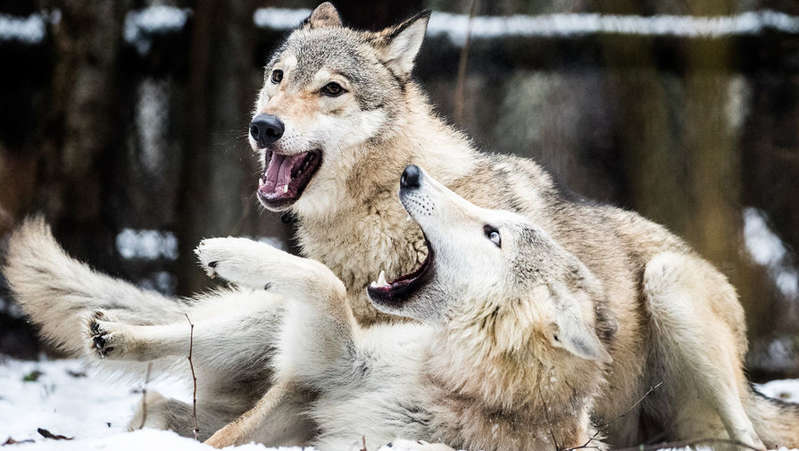
The zoologist explained the fear of Russians before the “invasion of wolves” migration
Russians should not be afraid of the “invasion” of wolves, since the authorities monitor their numbers, access to people and attacks on livestock, zoologist Dmitry Runkov told Gazeta.Ru.
“For this, the hunting supervision is working – they walk through the forests, check the tracks and mark the number of animals. After that, the number of wolves that must be destroyed is established. The same is the case with the fact of an attack on livestock, dogs or people: the animal is found and killed. Therefore, one should not expect an invasion, ”he said.
Predators come out to people because of the destruction of the ecosystem, and therefore the lack of food, Runkov noted. “This is an alarming sign. Most likely, hunger forces them to attack livestock and dogs – in winter there is usually a harsh lack of food. If we talk about attacks on people, then most likely there are females behind them, who protect the cubs, ”the specialist explained.
Earlier, a zoologist specializing in wolves, a teacher at Moscow State University, spoke about this. Lomonosova Elena Litvinova.
“For the most part, we are talking about deforestation. Because of such a violation of the ecosystem, wild ungulates leave the forest, which are the main food of wolves.
The wolves have nothing to eat, and they go out to people. If we took care of the natural ecosystem, then, of course, there would be much less problems, ”she told Gazeta.Ru.
The coordinator of biodiversity conservation projects of the World Wildlife Fund (WWF) Alexandra Karnaukhov agreed with her.
“Of course, it is much easier for wolves to hunt a domestic lamb than to continue hunting endangered ungulates. Almost any city dweller can already take an ATV or a snowmobile and drive into the thicket of the forest, and residential areas are also expanding. As a result, it is not surprising that meetings with wolves have become more frequent, ”he said.
At the same time, people, as a rule, do not know the habits of wild animals, therefore such meetings often end tragically, the specialist explained. “In fact, the wolf himself knows how to behave correctly, you just need to stay out of the way and slowly leave. The wolf is very afraid of man. But people themselves often come up, want to look or begin to defend themselves, although the wolf was not going to attack, “said Karnaukhov.
On April 20, the National Anxiety Index, prepared by CROS, was published. The company identifies and ranks phobias based on analysis of news in the media and the most discussed topics on social networks.
In terms of importance for citizens in the first quarter of 2021, the second place was taken by the fear of the “invasion of wolves” – this topic was discussed 5.9 times more actively than in the fourth quarter of 2020.
According to analysts, the fear of the “invasion of wolves” has become relevant due to the aggravation of this problem in many regions: Arkhangelsk, Omsk, Nizhny Novgorod, Smolensk, Pskov and Kirov regions, Moscow region, Komi, Karelia and Buryatia.
Residents of the Arkhangelsk region, for example, in February 2021, reported 170 times to emergency services about the release of wild animals to settlements. The overwhelming majority of these appeals were associated with wolves, they were seen in the sleeping areas of Arkhangelsk, writes the Snob magazine.
At the end of March, the regional authorities even increased the remuneration for wolf hunting: up to 15 thousand rubles for a female and 12 thousand for a male. Previously, 10 thousand rubles were paid for any killed wolf.
Zoologist Runkov considers it a norm to report encounters of people with wolves in these regions.
“There are large forests, and wolves move between regions calmly. For example, in 2020 a large flock lived in Komi, and then left for Buryatia due to lack of food.
Wolves are far from stupid animals – much smarter than dogs. Therefore, if the amount of food in one region has decreased – and this predator eats about 50 tons of meat per year – then the flock will go to another, ”the expert explained.
He also stressed that hysteria about the “invasion of wolves” can be inflated artificially. “The problem is this, one person saw a wolf in his village, and then another animal was noticed in a neighboring village. People posted the whole thing on social networks and began to talk about the fact that the wolves do not give rest, bred. In fact, it could be the same predator, ”Runkov said, adding that wolves can walk more than 50 km daily.
At the same time, Litvinova clarified that feral dogs are often mistaken for wolves. “After all, no one can accurately identify whether it was the wolf who attacked. In addition to wild dogs, in some regions there are hybrids of wolves and domestic dogs. They behave like predators, but they also have domestic habits, so it is quite natural for them to go out to people, ”she concluded.
Earlier, the Ministry of Natural Resources told Gazeta.Ru that in 2020, 210 cases of wolf attacks on people were recorded, and wolves attacked domestic animals more than 23 thousand times.

